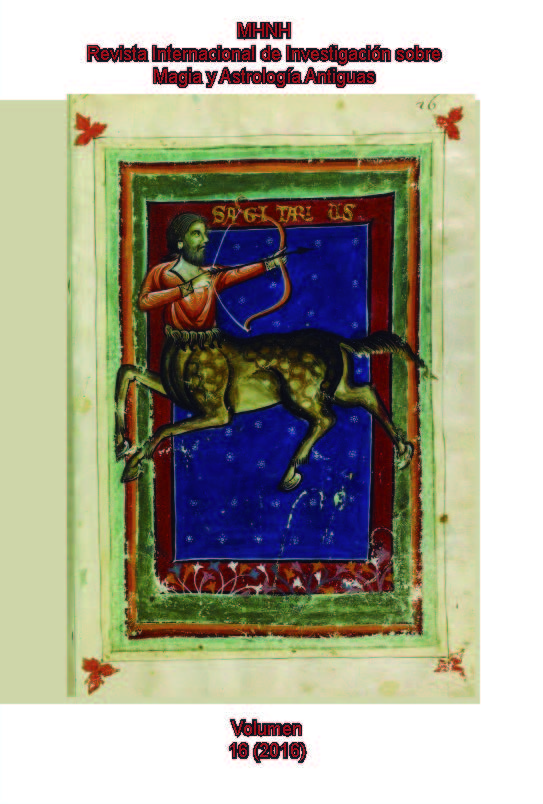Signification du Rêve Incubatoire chez les Anciens: Études Morphosématique, Exégétique et Psychanalytique à travers Quelques Documents Épigrafiques et Littéraires en Grèce Ancienne
DOI:
https://doi.org/10.24310/mhnh.vi16.15630Resumen
Dans toutes les civilisations antiques, l’incubation (in « dans », cumbo « coucher, dormir ») faisait partie des pratiques religieuses permettant à l’homme de communiquer avec le divin ou le surnaturel. Chez les Égyptiens, elle est souvent présentée comme un véritable cauchemar subi exclusivement par les femmes, cauchemar au cours duquel la femme, en rêve, est abusée sexuellement par un dieu démoniaque. En Grèce ancienne, en revanche, l’incubation est tout à fait différente, elle crée un autre type de rapport entre l’humain et le divin, elle constitue une opération active et volontaire permettant au rêveur de recevoir une réponse ou une solution à ses problèmes de la part des dieux. Ainsi
dans cet article, l’intérêt est porté sur l’étude de ce type de rêve à travers des documents témoins : les conditions de naissance de ce rêve, son rapport avec la vie psychique à l’état de veille, les stimuli qui se pressent pour être perçus pendant le sommeil et le jeu de l’affect sur l’état de santé du rêveur, sont étudiés dans tous leurs aspects (à la fois morphosémantique [narration], religieux [croyance] et psychanalytique [psychisme]).
Descargas
Métricas

Descargas
Publicado
Cómo citar
Número
Sección
Licencia

Esta obra está bajo una licencia internacional Creative Commons Atribución-NoComercial-SinDerivadas 4.0.

Esta obra está bajo licencia internacional Creative Commons Reconocimiento-NoComercial-SinObrasDerivadas 4.0.
Todos los contenidos publicados en MHNH. Revista Internacional de Investigación sobre Magia y Astrología Antiguas están sujetos a la licencia Creative Commons Reconocimento-NoComercia-Compartirigual 4.0 cuyo texto completo puede consultar en <http://creativecommons.org/licenses/by-nc-sa/4.0>
Se pueden copiar, usar, difundir, transmitir y exponer públicamente, siempre que:
- Se cite la autoría y la fuente original de su publicación (revista, editorial y URL de la obra).
- No se usen para fines comerciales.
- Se mencione la existencia y especificaciones de esta licencia de uso.
Los derechos de autor son de dos clases: morales y patrimoniales. Los derechos morales son prerrogativas perpetuas, irrenunciables, intransferibles, inalienables, inembargables e imprescriptibles. De acuerdo con la legislación de derechos de autor, MHNH. Revista Internacional de Investigación sobre Magia y Astrología Antiguas reconoce y respeta el derecho moral de los autores/as, así como la titularidad del derecho patrimonial, el cual será cedido a la Universidad de Málaga para su difusión en acceso abierto. Los derechos patrimoniales, se refieren a los beneficios que se obtienen por el uso o divulgación de las obras.MHNH. Revista Internacional de Investigación sobre Magia y Astrología Antiguas se publica en open access y queda autorizada en exclusiva para realizar u autorizar por cualquier medio el uso, distribución, divulgación, reproducción, adaptación, traducción o transformación de la obra.
Es responsabilidad de los autores/as obtener los permisos necesarios de las imágenes que están sujetas a derechos de autor.





